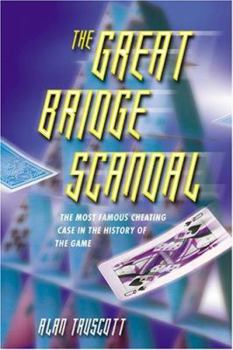The Great Bridge Scandal: The Most Famous Cheating Case in the History of the Game
In 1965, the bridge world was rocked by an accusation of cheating at the world championships in Buenos Aires. The pair involved were Britain's Terence Reese and Boris Schapiro, two of the world's best... This description may be from another edition of this product.
Format:Paperback
Language:English
ISBN:1894154673
ISBN13:9781894154673
Release Date:March 2004
Publisher:Master Point Press
Length:251 Pages
Weight:1.00 lbs.
Dimensions:0.7" x 6.1" x 9.1"
Customer Reviews
1 rating
a powerful and memorable work
Published by Thriftbooks.com User , 15 years ago
I bought this shortly after it first came out in hardback, and it was truly an eye-opening work. I had a student who was a tournament bridge player some years ago--he dismissed the idea out of hand that Reese and Schapiro, who were certainly one of the top bridge partnerships, would ever cheat. He thought the charges were frivilous, the idea ridiculous. So I loaned him my copy of the book. Truscott has been a careful person. The book details at great length individual hands and you'll see photographs of Reese and Schapiro holding their cards in a variety of ways--fingers were used to indicate the number of hearts that they held. When you sometimes have one finger out, sometimes two, sometimes three, sometimes split your fingers (think of Spock on Star Trek), etc, it can look awkward. My student was convinced by the book, but was a sadder person. The natural reaction is "Reese is a top player. He doesn't have to cheat". That's very true. But it's also true that baseball players such as Bonds, McGwire, and Sosa didn't "have to" cheat: neither do Tour de France racers, nor did other similar figures. But steroids and corked bats (in Sosa's case) and other drugs were used. If you're in, say, the top 10 in your field, the possibility may arise to improve to the top 3, for example. It may also involve ego and not liking to lose. Truscott's book relates how Reese had boasted to friends (and offered to bet on it) that he could cheat at bridge without anyone being able to detect his methods: this sounds like an ego trip, for there was certainly no need for a person of Reese's ability to cheat. Truscott's book describes previous occasions of cheating in bridge, and it relates the disillusionment felt by people who watched Reese and Schapiro at the table exchanging signals. Hands are shown where the bidding and play--such as the opening lead--make no sense at all unless you know much more about your partner's hand than you should. A hearing was held in England--the chair of which knew relatively little about the game, and so would have been blissfully unaware of when bidding or play would have been unusual. Confessions were basically ignored, and Reese and Schapiro were acquitted. But innocent? Read the book. Bobby Wolff has a fine new book out: "Lone Wolff" which describes cheating and what might politely be termed "ethical lapses". You'll find in this book numerous cases of where when cheating was discovered in a tournament the culprits were let off. One of the most egregious cases was (as I recall) in the Bermuda Bowl where an Italian team of less than stellar bridge gifts but with a series of remarkable performances were caught exchanging information through foot-tapping under the table. The team was reprimanded, but allowed to continue in the tournament. Reese and Schapiro had vastly more natural talent than this Italian team. Schapiro told the British captain that Reese had pressured him into cheating, so we still have the b




